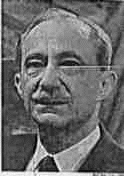| [HomePage] | Prof Morris Kline | |
OBITUARY
Morris Kline, 84, Math Professor And Critic of Math Teaching, Dies
by Eric Pace

Morris Kline, a professor of mathematlcs who was a longtime critic of the way mathematlcs was taught, died early yesterday at Maimonides Hospital in Brooklyn. He was 84 years old and lived in Brooklyn.
He had been in declining health, and his death was caused by heart failure, said his wife, the former Helen Mann.
From 1938 to 1975, Professor Kline taught at New York University, with time out as a civilian employee in the Army in World War II. He was the author or editor of more than a dozen books, including "Mathematics in Western Culture" (1953), Mathematics: The Loss of Certainty" (Oxford University Press, 1980) and "Mathematics and the Search for Knowledge" (Oxford University Press, 1985).
In a 1986 editorial in Focus, a Journal of the Mathematical Association of America, he summarized some of his views: "On all levels primary, and secondary and undergraduate - mathematics is taught as an isolated subject with few, if any, ties to the real world. To students, mathematics appears to deal almost entirely with things whlch are of no concern at all to man".
The Key to Understandlng
The error, he contended, was that "mathematics is expected either to be immediately attractlve to students on its own merits or to be accepted by students solely on the basis of the teacher's assurance that it will be helpful in later life." And yet, he wrote,"mathematlcs is the key to understanding and mastering our physical, social and biological worlds."
He argued that teachers should stress useful applications of mathematics in various other fields: that they could have elementary schoolchildren deal wlth baseball batting averages and puzzles, get high school students work with statistics and probability, and bring college students to apply mathematics to computers and and physics.
But, he said, many schoolteachers are simply unfamiliar with such teaching techniques, and the same is true of numerous college professors who were under "pressure to write research papers." He called on professional mathematics journals to print articles that instructed school and college teachers about ways of presenting such applications to their pupils and students.
Doubts on its Utility.
Professor Kline himself came to doubt the utility and importance for what he called "the life of Man". He himself turned to applied mathematics since, as he once put it, "the greatest contribution mathematics has made and should continue to make was to help man understand the world about him."
He was perennially interested in the cultural significance of mathematics., and he took up that subject notably in his 1980 book "Mathematics: The Loss of Certainty," which William Barrett writing in the New York Times Book Review, called "intensely dramatic, immensely readable" in its treatment of "the decline of mathematics from its once lofty pinnacle as the supreme embodiment of human certainty to its present uncertain state rent by conflicting schools."
In his 1973 book, "Why Johnny Can't Add: The Failure of the New Math," Professor Kline was critical of the New Math, an educational trend of the 1960's. Reviewing the book in The New York Times, Harry Schwartz said "its significance goes far beyond its immediate topic. It raises the broader issue of how, in field after field in American life, there come to be sudden fixations on supposed panaceas for perceived problems. All too often however, these panaceas turn out to have unforseen consequences as bad as or worse than the original difficulties that triggered their adoption."
Morris Kline ws born in Brooklyn, the son of Bernard kline, an accountant, and the former Sarah Spatt. He grew up in Brooklyn and in Jamaica, Queens. He graduated from Boys High School in Brooklyn and went to study mathematics at New York University, where he earned a bachelor's degree in 1930, a master's degree in 1932 and a doctorate in 1936.
In addition to his wife, to whom he was married in 1939, Professor Kline is survived by a brother, Emanuel, of Great Neck, L.I.; two daughters, Elizabeth Landers of San Francisco and Judith Karamazov of Boston; a son, Douglas, of Cambridge, Mass., and three grandchildren.
The above obituary first appeared in The New York Times, June 10, 1992.
Version: 21st December 2018
|